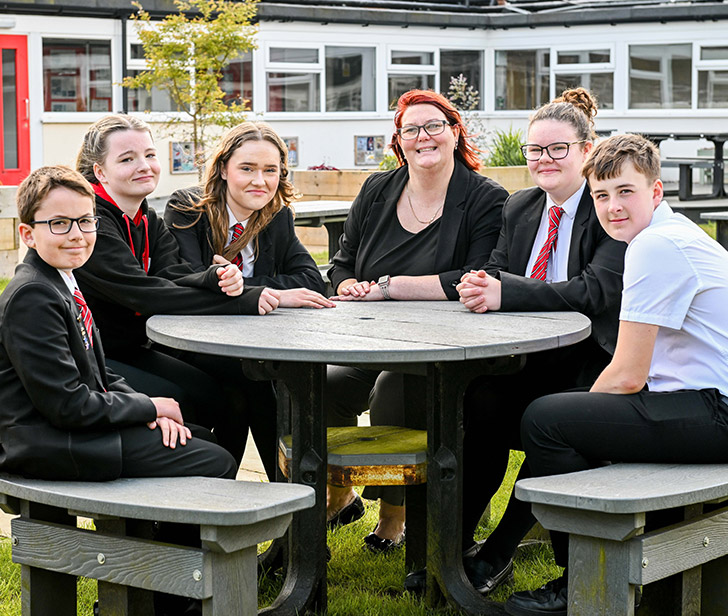English
1. Rationale
The study of English provides students with the skills required to engage with and influence the world around them; it enables pupils to communicate their thoughts and feelings effectively both through the written and spoken word. Through reading in particular, pupils have a chance to develop culturally, emotionally, intellectually, socially and spiritually so that they are well read and well prepared for life after Kirton Academy. We aim to ensure that all our students develop a love for a strong literary heritage that celebrates a vast wealth of great writers.
2. Aims
2.1 During their time at Kirton Academy, students will:
- Have narrowed the gap between KS2 starting points and national average age expectations. Pupils typically come in below the national average in English and maths
- Be able to use ambitious and precise vocabulary to communicate meanings and ideas
- Pupils will be able to express their ideas, views and opinions about a wide range of topics in a clear and thoughtful way
- Pupils will be able to write fluently and accurately and develop detailed ideas, adapting language to suit audience and purpose
- Pupils will be able to confidently read a range of texts and explore meanings, ideas and methods used in a detailed and developed way.
- Pupils will be able to develop mastery and retention of key skills
- Pupils will develop cultural awareness in order for them to succeed academically and engage in wider society
3. The rationale for Sequencing (Scope and Rigour)
At Kirton Academy School we develop a love of reading and writing through a curriculum that is inclusive, engaging and challenging. Throughout their time here, students are exposed to challenging, ambitious texts and materials from a range of rich and varied literary heritage. We have developed a rigorous spiral curriculum so that all students are challenged and develop a secure understanding of the skills needed to succeed at GCSE and life after Kirton Academy. The spiral nature of the curriculum is designed to build upon prior learning so that students are able to know more and remember more. The curriculum sequence develops mastery so that students are encouraged to start making links between texts and apply skills more confidently and independently as they move through the curriculum.
3.1 Why?
At Kirton Academy we have developed a KS3 curriculum in English that we feel enables our students to develop and master a wide range of skills through a range of fiction and non-fiction texts which complements the KS4 curriculum. The spiral curriculum structure ensures students build upon their understanding of these skills across the three years so that there is an increased complexity and challenge as student's progress towards KS4. To facilitate this approach, the curriculum is structured into thematic topics which include opportunities for students to revisit and develop skills through a range of modern and classic fiction, a wide range of poetry and plays. In addition, we have developed several thematic topics where students engage with non-fiction texts critically.
At KS4, all students study English Language and English Literature at GCSE. We offer the AQA syllabuses for English Language and English Literature. In English Language, students will develop an ability to read critically and to respond to unseen literary extracts and non-fiction texts. They will learn to write for an audience and purpose and will develop their creative and discursive writing skills. In Literature, students will study one pre-twentieth century text, one modern text, a whole Shakespeare play and a collection of themed poetry. Students will also develop the ability to respond to poems that they have never seen before. All students study the same literature texts which allows for intervention sessions, collaborative.
4. Research informing the Sequencing decisions.
Both Rosenshine's Principles of Instruction and Cognitive Load Theory have informed our curriculum sequencing and implementation. Both recognise the importance of memory in building schemas required to develop mastery and retention. Our schemes of work are sequenced so that students revisit skills and build upon prior learning over time, chunking more complex concepts into smaller parts. A scaffolded approach, combined with modelling and step by step success criteria means students are exposed to new skills and concepts gradually, building strong foundations and links across texts and skills.
English skills:
The curriculum is sequenced with clear outcomes for each scheme of work, each year and each key stage. Through the study of a wide range of fiction and non-fiction texts, students develop their ability to identify and interpret themes and ideas, draw on inferences and justify these with evidence. Pupils apply the knowledge gained from the study of other writers to produce a range of texts, written effectively for different purposes and audiences; they are taught to select vocabulary, grammar, form, and structural features to reflect audience, purpose and context and use language imaginatively and creatively.
5. Key Themes
| Key Theme | Overview |
|---|---|
| Human Experience | Explore the theme of people, places, events and relationships |
| Power of words | Explore how words can construct meanings and ideas, influence readers and convey mood and atmosphere |
| Perspectives | Explore writers' viewpoints and attitudes through non-fiction texts as well as writing non-fiction texts which convey our own opinions and feelings on different topics. |
| Identity | Explore and analyse what makes us who we are and the complex relationship we have with identity |
| Morality and Ethics | Consider the rights and wrongs of events, choices and viewpoints alongside societal views |
| Overcoming barriers and challenges | Explore feats of extraordinary bravery, courage, determination and bravery. |
Download — 5-Year Learning Journey
Download — Curriculum Overview


